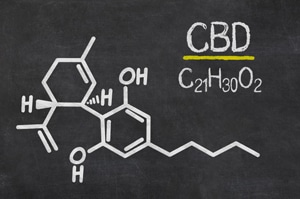
November 19, 2018
More on CBD
By Michael D. Shaw
This column has covered cannabidiol (CBD) on previous occasions. (A Look At CBD; CBD, Diabetes, And Sleep.) The main attraction of this extract is that it provides virtually all the medical benefits of cannabis, without the psychotropic effects. That is, it does not contain tetrahydrocannabinol (THC).
As it happens, industrial hemp is defined in both the 2014 and 2018 farm bills as containing less than 0.3% THC. While hemp cultivation is currently legal in many states, the 2018 farm bill would make it legal to grow in all 50 states. That’s a good thing, since hemp-derived CBD (very low THC content) is the prized commodity, as it also is legal in all 50 states.
CBD is an exciting product, and the industry has been growing quickly. As such, it would be helpful to cite some basic points.
1. The history of cannabis goes back at least 10,000 years, and it might even be the very first agricultural crop. Its first use as a medicine dates to 2737 BC.
2. Links to research are presented describing how CBD is used to treat 46 conditions, including Alzheimer’s, anorexia, anxiety, cancer, Crohn’s and colitis, heart disease, migraines, multiple sclerosis, Parkinson’s, schizophrenia, and sleep disorders.
3. CBD oil can be extracted by a variety of processes, each with its own advantages and disadvantages. Many producers favor the supercritical carbon dioxide method.
4. Hemp is a bioaccumulator, in that it absorbs substances from the air, water, and soil. Thus, many CBD buyers prefer a product that is grown organically.
5. A distinction is made between full spectrum CBD and CBD isolate. The full spectrum product includes several other cannabinoids (with THC present below 0.3%), while the isolate is pure CBD. Proponents of the full spectrum product argue that it offers more benefits. Interestingly, research indicates a standard pharmaceutical dose-response effect with the full spectrum product that is not observed in the isolate. As it is, of all the cannabinoids, CBD is by itself the most efficacious.
6. What about dosage? Because CBD does not have quite the history of long-established pharmaceutical drugs, dosage initially can be a bit of careful trial and error, starting with the label instructions. Body weight should also be considered, with other helpful suggestions given on the linked page.
7. Dosage is one thing; bioavailability is another. The greatest bioavailability occurs with intravenous administration, but few would choose this option. As to the conventional oral route, a review article from 2009 mentions a mere 20% (at best) getting into the bloodstream. The sublingual method improves the figure to 35%. The vaping method jumps this to 56%.
8. Related to this is CBD as a tincture. A “tincture” is a solution–often in alcohol–of extracted herbal materials. As alluded to above, these are used sublingually, and are an effective method of taking CBD.
9. Dealing with the taste and aroma of CBD–especially the full spectrum product: Various flavoring agents are added to mask the taste, although these are necessarily provided in the less bioavailable forms.
Given the proliferation of CBD products, you should take care in choosing your supplier. Arming yourself with the nine points above should prove helpful. No doubt, the FDA will soon weigh in on CBD, and the companies involved would be well-advised to operate as if they already were regulated.
I was recently introduced to Headway Bio-Sciences, a company focused on pain management, anxiety, and skin conditions–with an emphasis on hemp extract medicinals. Founder John Head personally experienced healing with these products, and encourages others to try them.
I’ll give the last word to Kat McCool, Director of Operations for Headway Bio-Sciences:
“Transparency determines everything we do, from the ingredients we use to the products we offer to the people we seek to help. That commitment allows us to stand apart from–to stand above–the competition, not because we think we are better, but because we know we can better the lives of our consumers. We do not make blanket assertions, nor do we issue outlandish claims. We do our best, never forsaking the individuals we represent, the integrity we recognize, and the ideals we hope to realize.”
